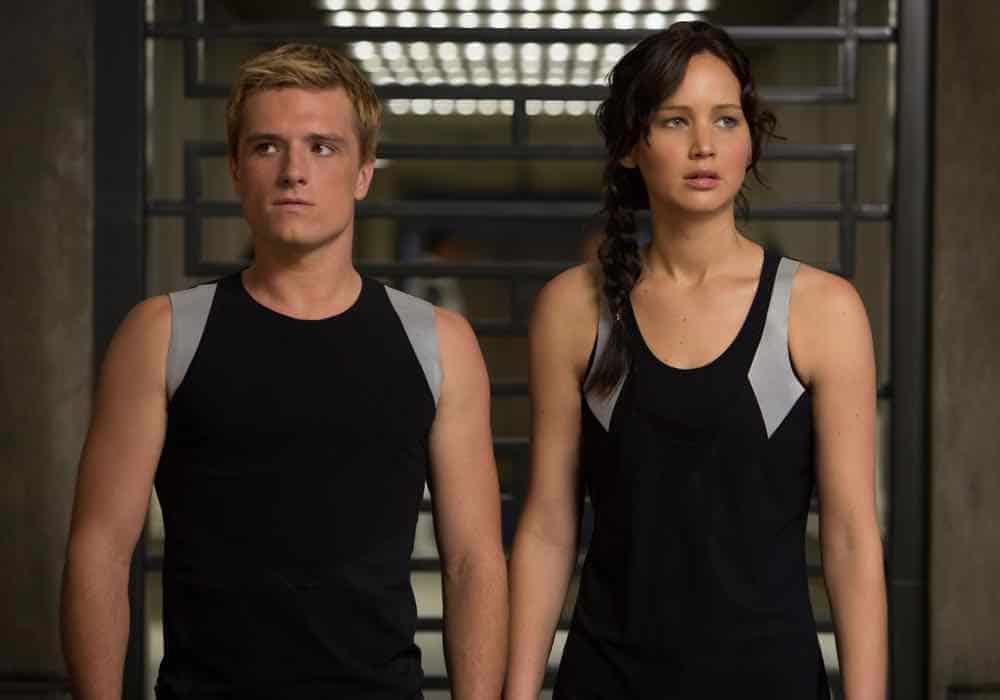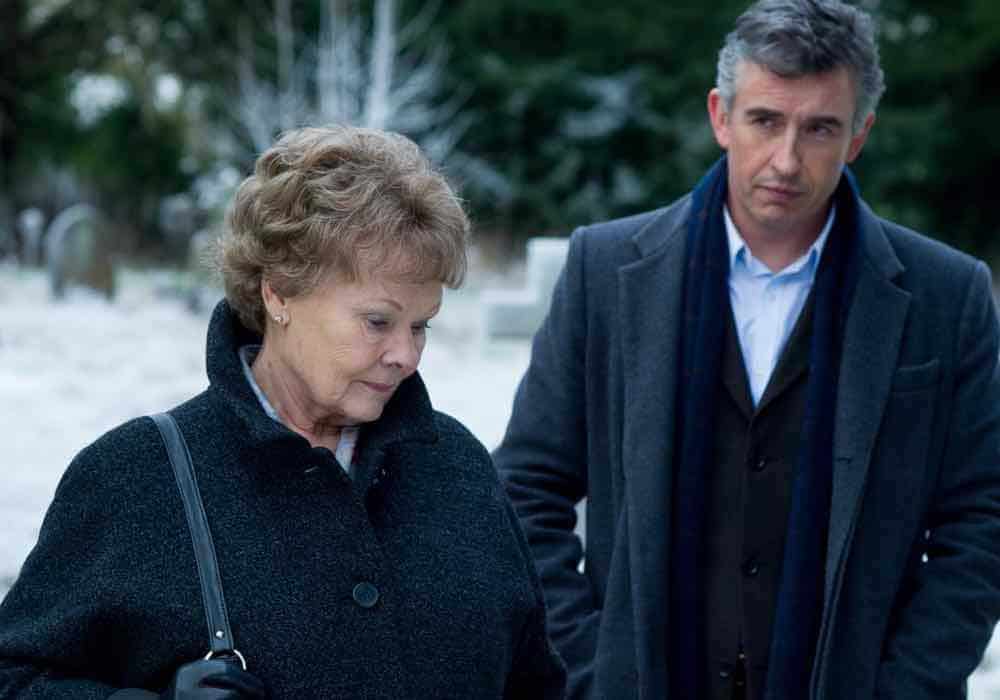The Hunger Games: Catching Fire is the rare intelligent mainstream film that’s full of compelling characters and emotional weight.

Katniss Everdeen (Jennifer Lawrence), “The Girl on Fire”, is no ordinary heroine: she’s smart, deadly with a bow-and-arrow, strong and brave, but most of all her compassion is her superpower. Her love for her sister Prim is so strong that, in The Hunger Games, she risks her life by volunteering to take Prim’s place in the eponymous televised battle-to-the-death which pits two children “tributes”, a boy and a girl, from each of Panem’s 12 districts, against each other. Growing up, she fed her family by hunting illegally, a skill that makes her deadly in the arena. But it’s her strength of character and the fabricated, actively performed for the cameras, romance with the boy tribute from her District, Peeta Mellark (Josh Hutcherson), whom she ultimately insists on protecting even when he’s a liability, that wins her the games.
That such a strong, independent-thinking woman could be the center of an action film, where the emotional content is more important than the thrills, is unprecedented in Hollywood. Especially if you consider that Gary Ross’s The Hunger Games and Francis Lawrence’s sequel The Hunger Games: Catching Fire are anything but chick flicks. Ross’s The Hunger Games was as good as it was because of Jennifer Lawrence’s outstanding performance as Katniss Everdeen; The Hunger Games: Catching Fire also rests entirely on her shoulders. Lawrence’s captivating performance is at its best in close-ups, which show a myriad of conflicting emotions: her fear, her resolve, her compassion, her performed love, and the blurring line as the performance of love leads to genuine love.
The strength of Katniss Everdeen as a character is what makes The Hunger Games: Catching Fire so compelling. The film tells the powerful story of a girl who slowly loses everything dear to her, only to be thrown back into the hell that got her there: the arena of yet another Hunger Games, this time competing against past victors. Director Lawrence allows us to see Katniss’s devastation, and the determination this gives her to fight for what she believes in: to save Peeta in the games, and even to somewhat unknowingly spark a revolution through acts of kindness and compassion. She’s neither debilitatingly feeling nor stone cold: she’s real and complicated and doesn’t conform to any stereotype. It’s the driving force behind the books, and it’s still very present in the film: her journey to become the face of the rebellion is her emotional journey, which is why following her through all the turmoil is thrilling and satisfying but never manipulative. Director Lawrence ensures that we are always in the moment with Katniss, by showing all the devastating brutality of the horrors Katniss witnesses and experiences. The result is an extremely vivid, immediate, and emotionally intense film.
Some important nuances of Katniss’s struggle get lost in the translation to film. There’s an important metanarrative in the book, Catching Fire, about the stories that Katniss is telling publicly — her romance with Peeta — and privately — that Gale (Liam Hemsworth) is her best friend and only potential husband, even as the private narrative becomes less and less true. In the film, we’re no longer in Katniss’s head – and Jennifer Lawrence gets us as much in there as is humanly possible without internal monologue – so we aren’t fully witness to the conflicting stories she’s telling herself and how they begin to resolve. Meanwhile, there’s the story of what’s actually happening: in the book, Katniss and Gale grow apart because the glue of mutual need is no longer there while Peeta is the only one that can give Katniss any real comfort. Although we see her relationship with Peeta deepen in the film, the shift in these two relationships often isn’t clear in the film, especially since Gale is the first person we see comforting Katniss with her nightmarish hallucinations.
In The Hunger Games: Catching Fire, Peeta’s complexity is more fully realised than in the first film: we see his dry wit, his anger at the Capitol, his collected calm, his occasional impenetrability, and his love for Katniss. But the extremes of his personality are also subdued. Because the injury he incurred in The Hunger Games film was not nearly as severe in the film as in the books — he lost his leg in the books — we don’t get the same sense of his physical vulnerability or sacrifice. Equally, how he unquestioningly helps Katniss with her post-Games nightmares and helps her get through all of the public performances are instrumental in pushing their romance towards being more real than performed, in the book, but is only intermittently present in the film. Her devotion to him is no longer as clearly motivated.
Discover more great genre films
We love genre films that take a feminist perspective. Find out what films we think are worth watching and thinking about.
Maintaining narrative suspense necessarily requires the film to elide or merge events from the book. Katniss, as narrator of the books, is often clueless about what’s going on around her – Peeta even declares multiple times that “she has no idea, the effect she can have” – which means that it takes five events for her to figure out what an audience could figure out from the on-screen action of a single event. But there are too many sacrifices in characters and their relationships in the process, especially the full impact of the shared trauma that stitches Peeta, Katniss, and Haymitch (Woody Harrelson) together. As Haymitch explains, nobody wins the games; they only survive.
Although the film is a fairly faithful adaptation of the book – most of the key dialogue is retained – there are many cases where a single line was cut which was needed to maintain the narrative complexity, or where some new shorthand removes important shades of meaning. When Katniss suggests that she and Peeta marry to hedge their bets in keeping up the charade, he agrees and leaves abruptly, and the scene ends, relatively undramatically; in the book, Peeta storms out, to Katniss’s confusion, and Haymitch explains that it’s because “he wanted it to be real”. Haymitch has also become too apologetic instead of the caustically self-assured drunk of the books. The result is that many of the nuances in the books which rewarded re-reading are missing in the films.
When The Hunger Games: Catching Fire sends Katniss and Peeta back into the Games, everything should be fundamentally different from their first round, but the film too often minimizes these differences. We understand that the other Tributes are more intimidating – all experienced killers – but the couple from District 12 are no longer just lambs for the slaughter either: they’re part of a pack of allies that can be hard to trust. But when Peeta drops another bomb in the pre-Games interview — that Katniss is pregnant — it has little effect, while in the books it empowered Katniss. The script only allows Haymitch to comment on it once, and never returns to it during the Games, so its impact is lost. What is very clear is that although in the first games Peeta planned to risk everything to save Katniss, now they both plan to sacrifice themselves to save each other.
Their allies are near perfect renderings of the characters from the books who enrich the universe of the films, and add some great humour. There’s Finnick O’Dair (Sam Claflin), the outrageously handsome victor who has more empathy than he likes to let on; the provocative Johanna Mason (Jenna Malone) who won by pretending to be weak; the brainy if socially awkward Beetee (Jeffrey Wright); and the insightful but somewhat deranged Wiress (Amanda Plummer). But the film lacks the sardonic levity that characterized the victors’ interactions in the arena, their means of preserving their sanity in an impossible situation.
That Francis Lawrence’s film has managed to even capture 40% of the intensity of Suzanne Collins’s books, which are each emotional Mack trucks, makes for a moving and rewarding film. The Hunger Games: Catching Fire does an admirable job of capturing these very complex and dense books despite its shortcomings, but these may cause more severe problems in the next two Mockingjay films. Nevertheless, The Hunger Games: Catching Fire is the rare intelligent mainstream film that’s full of compelling characters and emotional weight. It may just be the best blockbuster of the year.
Read more: Mockingly Part 1: Too many hovercrafts, not enough Finnick >>

